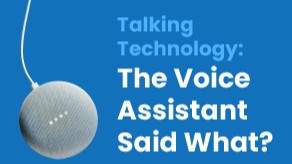Talking Technology: Read This Siri & Alexa AI Voice Assistant Usage Report
How often do you use Siri or Alexa? A little or a lot? Find out if your usage is below or above average by reading Voices’ report on voice assistant usage trends.

"Hey Siri, tell me about Voices' new report on voice assistant usage trends." "As part of the new report, entitled 'Talking Technology: The Voice Assistant Said What?', the online voice-over marketplace surveyed 1,000 Americans to determine which voice assistant technologies they use, how often they use them, and for what tasks. They also asked these respondents what challenges they face when using interactive voice technologies and how these obstacles could be overcome in the future."
Go to https://www.voices.com/company/press/reports/voice-assistants and read the report for yourself!
The Rise Of Voice Assistants
Voice assistants, which Voices defines as “digital tools designed to understand and respond to spoken commands from users,” rose to prominence in the early-to-mid 2010s with the introduction of Alexa, Siri, and Google Assistant. Since then, they have only grown in popularity, with 81% of survey respondents saying they use theirs at least once a day.
“Voice assistants are widely used across the United States,” explained a spokesperson for Voices. “They’ve become embedded in our everyday tech devices: if you own a smartphone, a Windows PC or Mac computer, or a car with a modern infotainment system, chances are you have a voice assistant at your fingertips.”
They Make Life Easier
The main purpose of most voice assistants is to provide users with a hands-free living experience. As such, they are programmed to complete a wide range of manual tasks, including information retrieval, communication initiation, media and entertainment management, smart home device control, and navigation assistance, among many others.
They're Not Perfect...
Despite how far voice assistant technology has come, many users still encounter challenges, Voices found. For example, the survey revealed that 60% of respondents have had issues with their voice assistants misunderstanding prompts. Moreover, 36% feel like their privacy and security are put at risk when using a voice assistant.
Another problem that many respondents have — 46% to be precise — is a general lack of understanding when it comes to what voice assistants are capable of. In other words, they aren't able to fully tap into the potential of their interactive technologies because they simply aren't aware of what they can and can't do. While a lot of this is self-inflicted, tech companies don't help by making information difficult to find and support hard to obtain.
...But They're Getting There
To address these challenges and increase usage, respondents suggested that the tech companies behind virtual assistants invest in customization options, better language and understanding models, and enhanced security measures.
“In the past year alone, tech companies have fiercely competed to create the best, smartest, and most useful chatbots,” said the spokesperson. “Smarter voice assistants that provide more of a natural and human experience could dramatically transform the way they’re used, spurring their growth during the generative AI boom.”
Find out how your voice assistant usage compares to the public by visiting https://www.voices.com/company/press/reports/voice-assistants

